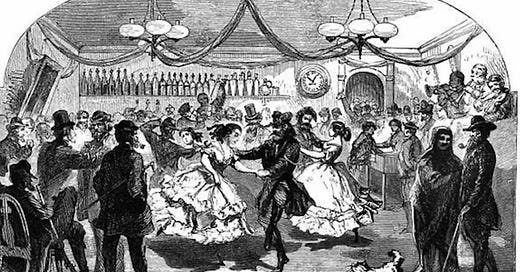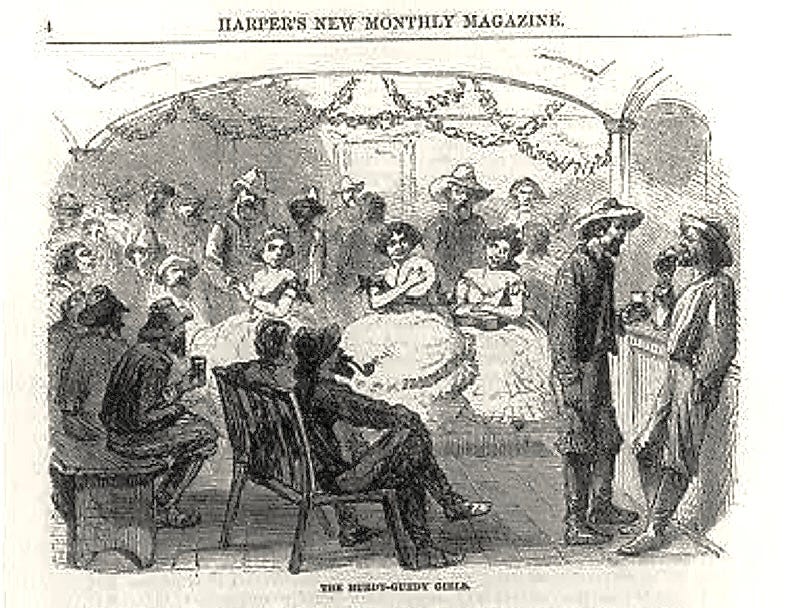Hurdy Gurdy Girl
A new song based on an old cowboy chestnut, part of Hal Cannon’s Cowboy Sutra album which comes out next month.
“Hurdy Gurdy Girl” is my contribution to the dozens of songs that trace back to “The Unfortunate Rake,” a late 18th Century English song that gives voice to a young soldier dying of venereal disease. He warns his comrade against salacious behavior, and then gives him instructions for his funeral. The most beloved American variant is “Streets of Laredo,” in which a gunshot young cowboy bemoans wasting his life on cards and drink. My version picks up themes from both versions but now the protagonist is an unfortunate dance-hall girl on the Western frontier.
LISTEN TO “Hurdy Gurdy Girl”
Roots of the song
Scholars trace “The Unfortunate Rake” back to the British Isles and there’s even an entire Folkways album of variations on the theme. If you’d like to poke around, try out these versions or click here to dig into the lost art of voluminous liner notes
“The Unfortunate Rake,” A.L. Lloyd
“The Young Girl Cut Down in Her Prime” Frankie Armstrong
“St. James Infirmary,” Cab Calloway
These songs are relatives, mostly cautionary tales about people who die in their prime from poor decisions. And in all of them, the dying person attempts to plan their own funeral.
The most famous of the American variants of “The Unfortunate Rake” include “The “Streets of Laredo,” sometimes known as “Cowboys Lament,” and “Tom Sherman’s Barroom.” Jack Thorpe, the first major collector of cowboy songs, said he encountered “Streets of Laredo,” in 1886. Many have claimed authorship, but it was probably penned by Francis Henry Maynard in 1876, who said he based it on “The Dying Girl’s Lament.”
Here are two versions set in the American West. “Tom Sherman’s Barroom,” from Kansas, had the greatest influence on my adaptation, but I also love Don Edwards’s Texas version of “Streets of Laredo.”
“Tom Sherman’s Barroom” – Dick Devoll
“Streets of Laredo” – Don Edwards
Gunsmoke, incense of the wild west
I admit, when I first imagined centering the song on a hurdy gurdy girl, I was influenced by memories of Gunsmoke, the long-running TV series I watched as a kid, about Marshall Matt Dillon and his trusted friend Miss Kitty, who ran the local saloon. In the mores of the day, Dillon’s calling was respectable and Miss Kitty’s ostensibly less so, but they collaborated to keep a safe place for men to drink, play cards, and flirt with women who danced for a living and lived upstairs.
Miss Kitty’s dance hall and saloon may have been loosely based on the hurdy gurdy houses that sprang up in frontier mining camps starting in the 1850s and later turned up in cow towns and other Western settlements. Early in the Gold Rush years, entrepreneurial saloon keepers realized that next to booze, the greatest attraction for these almost entirely male communities would be women who could dance and sing for a silver dollar.
The women were primarily peasant girls indentured from Europe, many from the Hesse region of Germany, who hoped to find opportunity in America. They brought their own songs, dance styles, and a traditional instrument from home, the hurdy gurdy.
Generally, these women were not intended to be prostitutes. Afterall, the saloon keepers needed to protect their expensive and delicate commodities. When I came upon the idea of conjuring up a scene at an old west dance hall, I first thought about a place that could protect young women and allow them to thrive. Afterall, in Gunsmoke, almost every episode revolves around some despicable character, most often an outsider, who rides into town to cause trouble. Every week, Marshall Dillan and Miss Kitty would deal with them and restore order, protecting the girls in the process.
But in real life, violations occurred, particularly with young women far from home. As I began to imagine a specific Hurdy Gurdy girl, a picture began to build and I felt like a time traveler, just wanting to give this poor woman a bit of dignity and respect at the end. It felt more like describing a scene than creating a fiction. I saw the procession in the distance, wending its way to the burial grounds – all women, some playing instruments, and a cart carrying the body of the poor woman who didn’t deserve to be betrayed by a crowd of men who only saw her as an object.
I know I’m mixing up real history with television, with folk song, and with revisionist thinking about gender, but that’s what you get with this version of the song. Yes, it’s a tragic story, told and retold, but in tragedy we learn and understand the world.
"Some believe it is only great power that can hold evil in check, but that is not what I have found. It is the small everyday deeds of ordinary folk that keep the darkness at bay. Small acts of kindness and love."
-J.R.R. Tolkien, The Hobbit, pub. 1937
The Hurdy Gurdy
The instrumental background of my song centers around the hurdy gurdy, that ancient stringed version of the bagpipe that plays by cranking a rosin-covered wheel. My thanks go out to Devon Lèger who plays the hurdy gurdy on this recording while I sing and play along on harmonium and English concertina. Thanks as well to C.W. Bayer for his insightful research into the musical history of early California and Nevada.
“Hurdy Gurdy Girl” Lyrics
As I rode down to Tom Sherman’s Dance Hall
Tom Sherman’s Dance Hall, one morning in May
Twas there that I spied a fair haired lady
All dressed in white linen as cold as the clay
They called her a whore, they made her an outcast
Their insults kept coming as they rode along
But all that I saw were my sister and mother
It’s a hostile place where she did not belong
It is once on the dance floor I used to be lovely
It’s once on the dance floor I used to be gay
For its taking to drink and then to the whoring
They gave me this sickness and now I must die
Go beat your drum loudly and turn the hurdy-gurdy
And play the dead march as you carry me along
Oh take me to the graveyard and roll the sod oe’r me
For I’m a fair lady and I know I’ve been wronged
Six merry dancers to balance my coffin
I don’t want no men a’joining the throng
Oh take me to the graveyard and roll the sod oer me
For I’m a fair lady and I know I’ve been wronged
Oh bring unto me some laudanum and water,
A glass of cold water the poor girl cried
And when I’d returned the spirit had left her
And gone to the giver the poor lass had died
Six merry dancers to balance her coffin
And only the women as they marched along
Oh take her to the graveyard and roll the sod o’er her
For she’s a fair lady and we know she’s been wronged






I'm here for the hurdy-gurdy and this delivers the goods.
I had to go back and listen to your rendition. Haunting and beautiful. A very familiar melody, it will stick with me for awhile. Thank you.